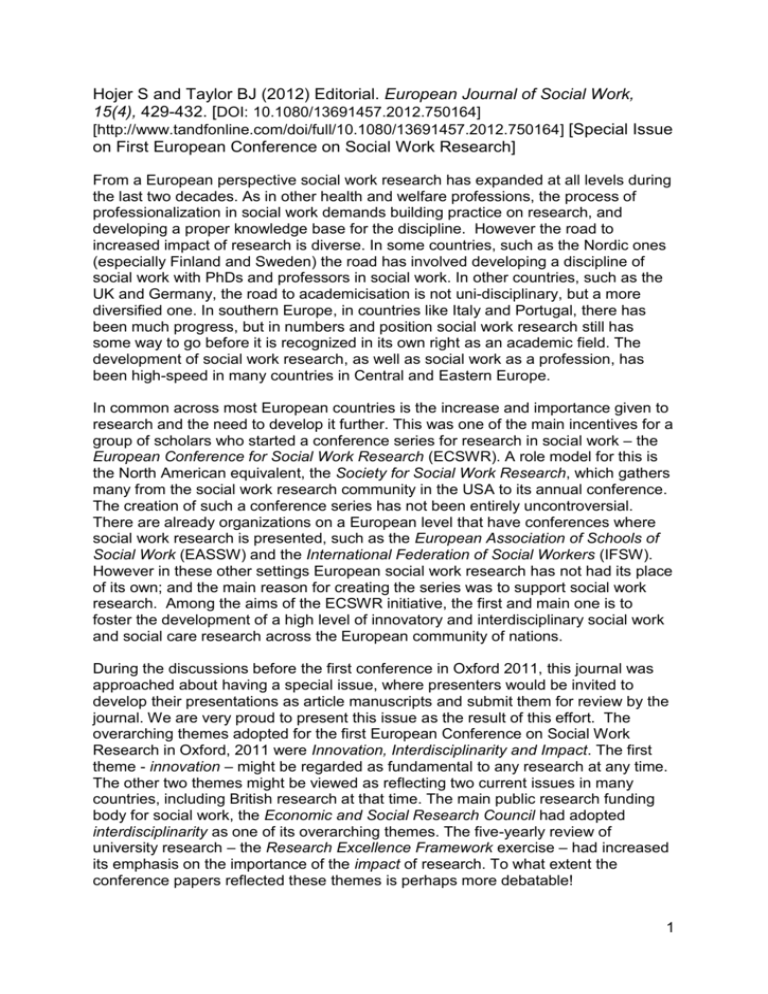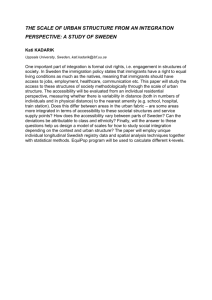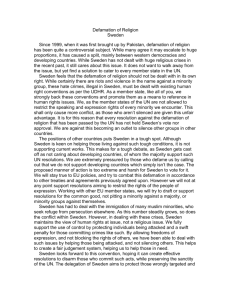EDITORIAL EJSW Special Issue on ECSWR 2011 Oxford
advertisement

Hojer S and Taylor BJ (2012) Editorial. European Journal of Social Work, 15(4), 429-432. [DOI: 10.1080/13691457.2012.750164] [http://www.tandfonline.com/doi/full/10.1080/13691457.2012.750164] [Special Issue on First European Conference on Social Work Research] From a European perspective social work research has expanded at all levels during the last two decades. As in other health and welfare professions, the process of professionalization in social work demands building practice on research, and developing a proper knowledge base for the discipline. However the road to increased impact of research is diverse. In some countries, such as the Nordic ones (especially Finland and Sweden) the road has involved developing a discipline of social work with PhDs and professors in social work. In other countries, such as the UK and Germany, the road to academicisation is not uni-disciplinary, but a more diversified one. In southern Europe, in countries like Italy and Portugal, there has been much progress, but in numbers and position social work research still has some way to go before it is recognized in its own right as an academic field. The development of social work research, as well as social work as a profession, has been high-speed in many countries in Central and Eastern Europe. In common across most European countries is the increase and importance given to research and the need to develop it further. This was one of the main incentives for a group of scholars who started a conference series for research in social work – the European Conference for Social Work Research (ECSWR). A role model for this is the North American equivalent, the Society for Social Work Research, which gathers many from the social work research community in the USA to its annual conference. The creation of such a conference series has not been entirely uncontroversial. There are already organizations on a European level that have conferences where social work research is presented, such as the European Association of Schools of Social Work (EASSW) and the International Federation of Social Workers (IFSW). However in these other settings European social work research has not had its place of its own; and the main reason for creating the series was to support social work research. Among the aims of the ECSWR initiative, the first and main one is to foster the development of a high level of innovatory and interdisciplinary social work and social care research across the European community of nations. During the discussions before the first conference in Oxford 2011, this journal was approached about having a special issue, where presenters would be invited to develop their presentations as article manuscripts and submit them for review by the journal. We are very proud to present this issue as the result of this effort. The overarching themes adopted for the first European Conference on Social Work Research in Oxford, 2011 were Innovation, Interdisciplinarity and Impact. The first theme - innovation – might be regarded as fundamental to any research at any time. The other two themes might be viewed as reflecting two current issues in many countries, including British research at that time. The main public research funding body for social work, the Economic and Social Research Council had adopted interdisciplinarity as one of its overarching themes. The five-yearly review of university research – the Research Excellence Framework exercise – had increased its emphasis on the importance of the impact of research. To what extent the conference papers reflected these themes is perhaps more debatable! 1 The conference call for abstracts certainly proved very attractive. Over 270 abstracts were received, of which half were accepted for presentation at the conference. All presenters were invited to submit their paper to this special issue. The papers in this special issue represent the fruits of those labours. What was distinctive about the conference, as opposed to other social work conferences, was the emphasis on empirical research, on theoretical and policy issues that directly support and strengthen empirical research, and on the use of empirical research to inform social work practice and policy. The papers included here represent that range of dimensions of research to support social work. Roger Smith from the UK sets the tone for the special issue, presenting a paper on value, practice and meaning in social work research. His argument suggests that social work research can claim to be distinctive and authoritative, with a combination of key characteristics that offer a distinctive sense of identity and purpose. In the only cross-national study included, Henglien Lisa Chen presents reflections on the methods used in a three-nation qualitative study of long term care of older people in England, Netherlands and Taiwan. This study highlights particular issues in crossnational studies such as the need for careful attention to geographical location; flexibility in programming data gathering; recognition of the local caring culture; and sensitivity to local and national language use. There are four papers on the application of research to inform practice. Marie Sallnäs from Sweden presents her survey study of access to resources among 272 children in foster and residential care by comparison with a reference group of 2940 children in the normal population in order to compare their wellbeing on a number of indicators. Peter Raeymaker and Danielle Dierckx from Belgium present a study of the integration of networks among human service organisations. They draw lessons from organisational sociology to inform the support structures for social work practice. Irene Stevens from Scotland argues for the use of complexity theory and social geography in risk assessments in social work practice. In a larger-scale quantitative study, Stefan Wiklund analyses factors associated with long-term recipiency among lone mothers in Sweden. There are three articles on developing the practice of social work research. Victoria Foster illustrates the use of drama as an arts-based method to study a pre-school child support scheme in England. Brian Taylor from Northern Ireland outlines models of professional judgement in social work, designed to strengthen research in this field.Trine Wulf-Andersen from Denmark presents poetic representation as a construction of new understandings of collaboration in participative social work research. There are two papers on policy and politics in relation to social work research, addressing some of the broader issues about how social work research is perceived, promoted and applied. Staffan Hojer and Peter Dellgran from Sweden present their study of the content and form of PhD theses in Sweden, drawing out the implications for the politics of social work research. Åke Bermark, Anders Bergmark and Tommy Lundström present the results of their reflections on evidence-based social work in Sweden, highlighting the mismatch between the map and terrain. 2 Where next for European social work research? A key issue is to find ways to strengthen empirical research, in particular experimental research that would demonstrate the effectiveness (or not) of particular interventions for particular types of problems that people present. We need to develop knowledge and skills in research methods, embracing a wide diversity of methods, selected according to the type of research question and the practicalities of data access and resources. We need to develop the interplay between theoretical development and empirical research, each feeding the other, rather than being seen as competing. We need to engage more earnestly in building national research infrastructures that will support social work research that demonstrably supports the profession and allied social care services. We need to build inter-professional collaboration, but not at the expense of losing the credibility of our own distinctive contribution. We need to build collaboration with other academic disciplines, engaging each to support the social work professional endeavor. Finally we need to build international collaboration, particularly amongst the countries of the continent of Europe, so that the learning in each place can enrich the research, policy and practice in other countries for the ultimate benefit of the clients and families whom we serve. After this conference in Oxford in 2011, the next one was held in Basel in March 2012. There is no special issue linked to the Basel conference, although of course presenters are welcome to submit their articles to the journal. The next conference will be held in Jyväskylä, Finland on 20-22 March 2013, from which a further special issue will follow, and the 2014 conference will be in Italy. At these conferences discussions about the future of ECSWR will continue. One question is whether it should only be a conference series for social work research, or should develop as the American SSWR, and have others activities as well such as individual membership, an ongoing budget, its own scientific journal, seminars and other activities to promote social work research. Allied to that is the question of whether it should be a distinct organization of its own or alternatively a sub-group of an existing organization. We believe there are arguments for and against all positions in this and are looking forward to continue discussing these issues across national boundaries in the future. And until the next conference we hope you will enjoy the articles in this special issue. We wish you some interesting reading hours ahead. Guest Editors Professor Staffan Höjer Department of Social Work University of Göteborg, Sweden Professor Brian Taylor Institute for Research in Social Sciences University of Ulster, Northern Ireland 3








